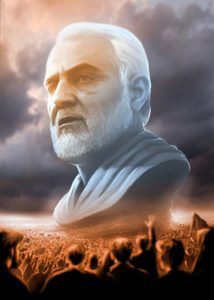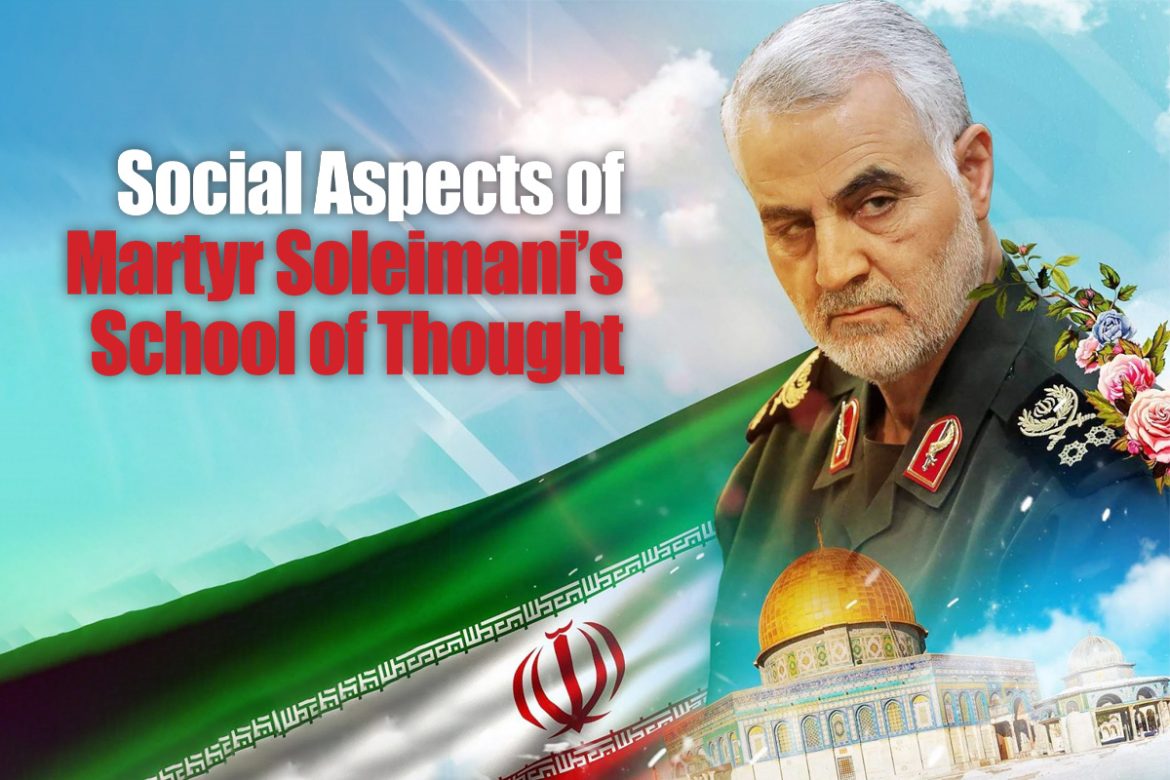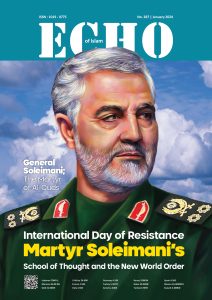By: Abdullah R. Makwinja, President of Ahl ul-Bayt Islamic Guidance Council of Zimbabwe
INTRODUCTION
After the glorious victory of the Islamic Revolution of Iran in 1979, the culture of altruism and martyrdom played an effective role in the conservation and fortification of the Islamic system. This culture enabled the Iranian nation to maintain honor and sovereignty of the country and has been an effective element in identifying and fighting enemies and a factor of resistance and victory in the eight long years of the Iraqi imposed war. This culture has also initiated progress in Iran through different components of the culture of altruism and martyrdom in different economic, scientific, military, and international aspects. And among the altruists and martyrs of Iran of the Islamic Republic General Qassem Soleiman appears extraordinary. This paper attempts to study the culture of martyrdom and altruism in martyr Qassem Soleimani’s school of thought, who along with his comrades was assassinated by the US army on January 3, 2020.
DEFINITION OF CONCEPTS
Conceptual Insight of Altruism
Altruism is a French terminology that was first used as a concept by the positivist sociologist Auguste Comte in the book “Systeme de Politique Positive” (Scott & Seglow, 2007, p. 1). According to Comte, altruism is an attitude of eliminating selfish desires and egocentrism and leading a life aimed at the welfare of others. The etymology of altruism is a combination of the Latin term “alter” with ui, which refers to other people. Later in the English version, it was mentioned as altruism and was introduced by George H. Lewes – a Comte’s follower. Robert L. Trivers asserts that altruism benefits another organism, not closely related. One human being leaping into the water, at some danger to himself, to save another distantly related human from drowning may be said to display altruistic behavior. If he were to leap in to save his own child, the behavior would not necessarily be an instance of “altruism”; he may merely be contributing to the survival of his own genes invested in the child.
Whilst from the Islamic perspective the term altruism is equivalent to the term Ithar which refers to giving preference to others over oneself, it is defined by moralists as seeking benefits for the community before thinking about one’s own needs.
Conceptual insight of Martyrdom
The word shahada (martyrdom) is derived from the Arabic verbal root shahada, which means to ‘see’, to ‘witness’, to ‘testify’, and to ‘become a model and paradigm’. A shahid is a person who sees and witnesses the truth physically and thus stands by it firmly, so much so that not only does he testify it verbally, but he is prepared to struggle and fight and give up his life for the truth, and thus to become a martyr. In this way, and by his struggle and sacrifice for the sake of the truth, he becomes a model, a paradigm, and an example for others, worthy of being copied, and worthy of being followed. (Ezaat, A:1986)
 Life of General Qassem Soleimani
Life of General Qassem Soleimani
Soleimani was born on 11 March 1957 in the village of Qanat-e Malek, Kerman Province to an impoverished peasant family. In his youth, he moved to the city of Kerman and worked as a construction worker to help repay a debt his father owed. In 1975, he began working as a contractor for the Kerman Water Organization. Soleimani joined the Islamic Revolutionary Guard Corps (IRGC) in 1979 following the Iranian Revolution. On 22 September 1980, when Saddam Hussein launched an invasion of Iran, setting off the Iran–Iraq War (1980–1988), Soleimani joined the battlefield serving as the commander of a military company. He quickly earned a reputation for bravery and rose through the ranks because of his role in the successful operations of retaking the lands.
After the war, during the 1990s, he was an IRGC commander in Kerman Province. Soleimani’s military experience helped him earn a reputation as a successful fighter against drug trafficking. The exact date of his appointment as commander of the IRGC’s Quds Force is not clear, but it was between 10 September 1997 and 21 March 1998. He was considered one of the possible successors to the commander-in-chief of the IRGC when General Yahya Rahim Safavi left this post in 2007.
On 24 January 2011, Soleimani was promoted to Major General by Supreme Leader Ayatollah Ali Khamenei. Later, in 2012, Soleimani assumed personal control of the Iranian intervention in the Syrian Civil War. Soleimani coordinated attacks, trained militias, and set up an elaborate system to monitor rebel communications. Soleimani was much credited in Syria for the strategy that assisted President Bashar al-Assad in finally repulsing rebel forces and recapturing key cities and towns.
Soleimani played an integral role in the organization and planning of the crucial operation to retake the city of Tikrit in Iraq from ISIS. The city of Tikrit rests on the left bank of the Tigris River and is the largest and most important city between Baghdad and Mosul, gifting it a high strategic value.
In 2015 Soleimani started to gather support from various sources in order to combat the newly resurgent ISIL and rebel groups which were both successful in taking large swathes of territory away from Assad’s forces. He was reportedly the main architect of the joint intervention in the region.
Soleimani was assassinated on 3 January 2020 around 1:20 am local time after missiles shot from American drones targeted his convoy near Baghdad International Airport. He had just left his plane, which arrived in Iraq from Lebanon or Syria.
Also killed were four members of the Popular Mobilization. The airstrike followed attacks on the American embassy in Baghdad. He was succeeded by Esmail Ghaani as commander of the Quds Force.
Even his enemies could fail to hide his greatness. For instance, “Qassem Soleimani can probably be considered “the man of the decade.” Skillfully using his unique preeminence within the Islamist regime, he exploited the so-called “Arab Spring” to revitalize Tehran’s imperialist ambitions, personally overseeing the regime’s effort to create a “Shiite Crescent” and expand Iranian influence across the region. His death leaves a deep leadership vacuum that will not be easily filled”. (Hacohen, G)
A former commander of US forces in Iraq, Petraeus, has talked about the unique features of his powerful rival in West Asia: “Qassem Soleimani is a very capable, resourceful and worthy enemy,” He plays his game well.”
His display of altruism
On battlefields, Qaseem Soleiman was always ahead of his soldiers. When we review the memoirs of his comrades, there is a feature in all the memoirs we get to know that he himself was always ahead of the soldiers in the field of danger. He always looked behind his back to see the pillar of his forces, not in front of him! According to them: “Our commander stood in front of the scene of the war and said, “Come,” but the classic commanders stand back and say “Go.” Qaseem Soleimani himself was a clear example of this. Qaseem’s statement “I will be your sacrifice,” was not just a word, but the word of his heart to be sacrificed for the people.
Trans-ethnic, trans-religious, and trans-sectarian
According to Martyr Soleimani, there was no difference between the sects of religions, his behavior and tactics were the same in the Shiite, Sunni, Yazidi, and Christian Muslim regions. The same concern he had for liberating the Sunni people from the hands of terrorists in Aleppo was equally worrying for the Shiites under siege in Nabl and Al-Zahra. His interaction with all political groups was also evident. In Iraq and Lebanon, Soleimani has had direct and continuous relations with all factions and politicians, Arabs, Kurds and Turkmen, Shiites, Sunnis and Christians, Islamists and liberals, statesmen and men of resistance, supporters and opponents of Iran, and according to Sheikh Jalal al-Din al-Saghir, the imam of the Tari Yakhi Bratha mosque congregation and a former member of parliament and leader of Saraya al-Aqida, even those who have made opposition to Iran a top priority, secretly lined up to meet Soleimani.
His love for martyrdom
Regardless of position, he was impatient for the moment to meet his beloved God. He never sought to gain power. He did not want the name and logo. Money was of no value to him. His focus was on service. It was to help and save others. He believed that a society without self-sacrifice is a society without life and heart. In a society where there is no self-sacrifice, there is no enlightenment. Sacrifice is not only at the levels of giving and dying, but self-sacrifice finds meaning and value in all levels of society in various dimensions and gives a true and original meaning and concept to society. In such a society, people do not think only of their own interests. At times he had to borrow from his father since his salary was not enough to cover his family expenses.
General Soleimani’s daughter has narrated: “On the day when Baba (father) received the Zulfiqar Medal from Hazrat Agha (the Supreme Leader), I congratulated him and he responded by saying: These are all worldly! Pray that one day I will receive a spiritual medal from God. Your father is just a soldier and a servant of the people, and you are a people and you are no different from the others.”
When he was offered to run for the presidency, he said, “I am the candidate for the bullets and the candidate for the martyr. I have been looking for my killer on these battlefields for many years and I cannot find him!” When he was told that the Western media had been zooming in on him for some time and talking about his assassination, he simply smiled and did not react.
Looking at the history of Haj Qaseem’s command in the Quds Force, his role in strengthening the resistance front against Israeli aggression and thus increasing the threats against this regime is evident. Liberation of southern Lebanon in 2000, the liberation of the Gaza Strip in 2005, the thirty-three-day war in Lebanon in 2006, and a key role in the Syrian crisis, to the extent that today we see the instability of Israel’s international security and political instability within this regime. It seems that Martyr Soleimani was a serious target of assassination by the Zionists. It can be claimed that the US’s decision to include his name in the list of targets was the result of Zionist lobbying. Of course, the Zionists had made efforts in this direction at times, but they failed to do so due to the vigilance of the Resistance Front and the fear of the severity of its consequences. Whenever political differences between Israel and the US government escalate, the Zionists try to reduce them by increasing tensions between the US and Iran.
The former Iranian President Dr. Hasan Rouhani, Soleimani asserts that General Soleimani was a general who never dismounted from the horse of jihad during these 38 years and his efforts were round the clock. Dr. Rouhani said, “The services of this great martyr for providing security to the country and the region, especially for the people of Iraq, Syria, Yemen, Lebanon, and Afghanistan, are unforgettable” (President Rouhani: 2020)
Conclusion
In a nutshell, Martyr Qassem Soleimani was not only a soldier but a thinker, a strategist, a diplomat, and a dedicated lover and follower of Imam Husain (AS).
References
Ezzat. A, The concept of martyrdom in light of the Islamic concept of Holy Struggle (Jihad) and the doctrine of enjoining right and discovering wrong, (1986). Muhammadi Trust of Great Britain Journal: Vol. 12 – 1986 [6]
Robert L. Trivers, Evolution of Reciprocal Altruism, http://www.jstor.org/stable/2822435. Accessed: 2/11/2022 18:02, P. 35
Frisch, Eytan Gilboa, Gershon Hacohen, Doron Itzchakov, and Alex Joffe. The Soleimani Killing: An Initial Assessment, Hillel The begin-sadat Center for Strategic Studies, Bar-Ilan University, Security and Policy Studies No. 168, accessed on 10/11/22
Scott, N and Seglow, J, Altruism, (2009) https://onlinelibrary.wiley.com/doi/10.1111/j.1467-9221.2009.00710.x, accessed on 10/11/22
Qasem Soleiman, https://www.studyiq.com/articles/biography-qasem-soleimani-free-pdf, accessed on 10/11/22
View this article in Echo of Islam 287





